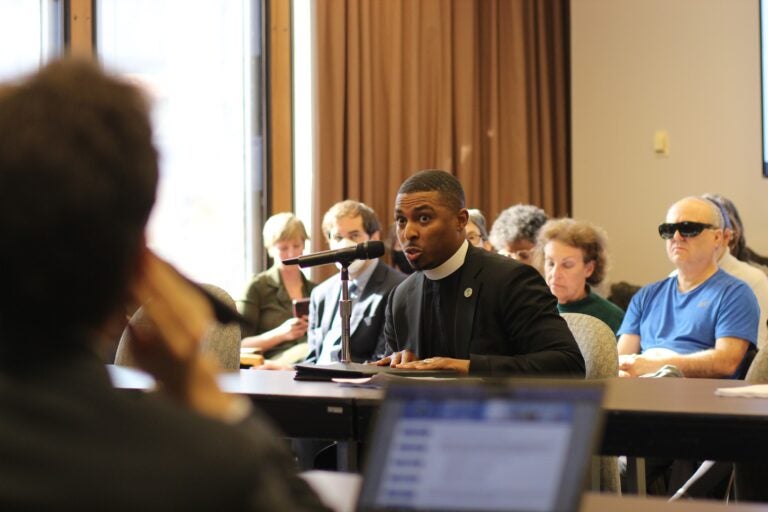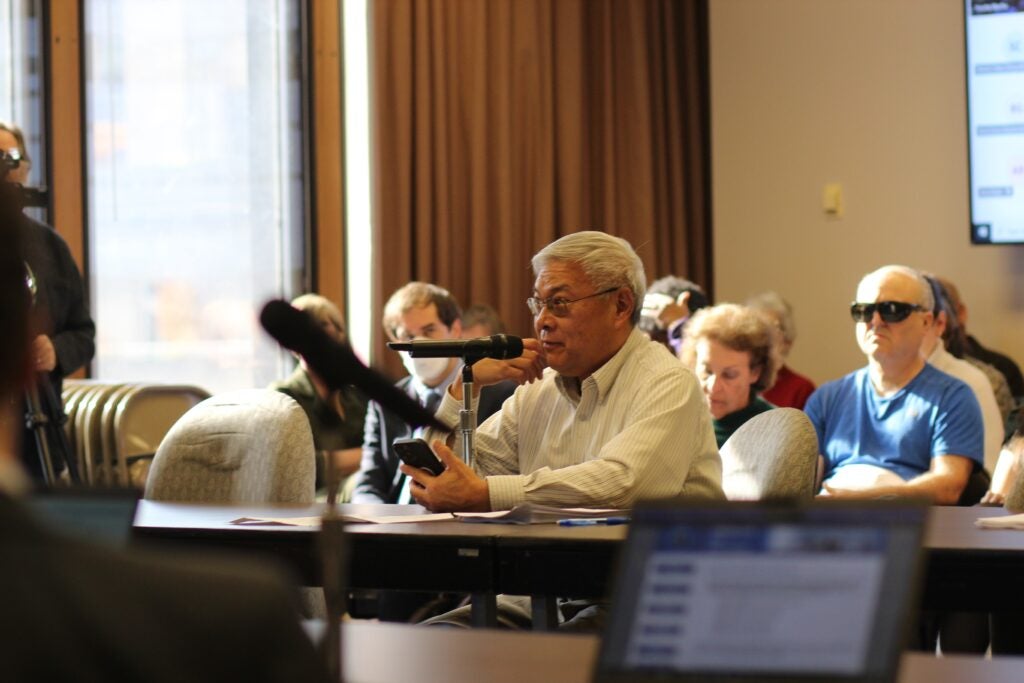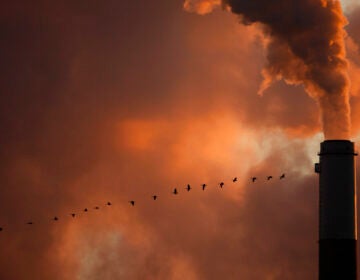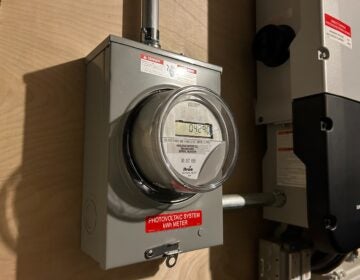Climate activists criticize exclusion from PGW’s budget process, propose new rules
The Public Advocate joined with a climate justice group to propose rules it says allow full participation in PGW’s budget process without bogging it down.
Listen 1:25
Councilmember Nicolas O'Rourke at a special hearing of the Philadelphia Gas Commission Monday, Nov. 18, 2024. (Jordan Teicher)
This story is part of the WHYY News Climate Desk, bringing you news and solutions for our changing region.
From the Poconos to the Jersey Shore to the mouth of the Delaware Bay, what do you want to know about climate change? What would you like us to cover? Get in touch.
More than two dozen people concerned about climate change condemned a new rule adopted by the Philadelphia Gas Commission that blocks third-party stakeholders from full participation in the budgetary process of Philadelphia Gas Works. The testimony came Monday during a special hearing of the commission, which had been requested by the climate justice group POWER Interfaith.
POWER, along with Community Legal Services, proposed amendments at the hearing that they say strike a balance between the need for meaningful public participation in PGW’s budget during a climate crisis, and the desire to insure an efficient process.
POWER has actively participated in PGW’s budget process for several years as a way to urge the city-owned utility to address its climate emissions. But in August, the commission, with the support of PGW, voted in favor of the rule that would exclude groups like POWER.
“Limiting participation in proceedings before the Gas Commission has no rational purpose other than to stifle meaningful review, limit the record of your proceedings, and weaken the city’s oversight of PGW,” testified Rob Ballenger, an attorney with Community Legal Services, which represents PGW ratepayers as the Public Advocate. “No legitimate value to the public, the city or the commission flows from this exclusionary regulation.”
While the rules adopted in August continue to allow Community Legal Services, acting as the Public Advocate, along with the Gas Works Employees’ Union Local 686, to participate in discovery, file formal briefs and submit expert testimony during budget proceedings, all other third-party entities are excluded. The Public Advocate’s role is limited to financial impacts on ratepayers, while Local 686 represents the interests of PGW’s unionized employees.
The rule does not prevent public comment during budget hearings, nor does it exclude written testimony to the proposed budget. But advocates say the most meaningful participation happens prior to any proposals or public hearings, where individual testimony is often limited to a couple of minutes and rarely influences decisions.
At the hearing, climate activists and PGW ratepayers repeatedly spoke of the contradiction between the city’s climate goal of zeroing out its carbon emissions by 2050 while simultaneously owning a fossil fuel utility. Given what they see as slow to no progress, they argued those impacted by climate change should have a seat at the table.
“It’s shameful that people have to come out here again, to pretty much plead with the Gas Commission not to shut them out of deliberations concerning their health and well-being,” said Pamela Darville, a resident of Germantown. “This is really shameful. I don’t feel very good about what’s going on with this Commission and this utility … This exclusion undermines efforts to ensure that PGW aligns with the city of Philadelphia’s carbon neutrality target.”

Darville also said the city-owned utility needs to comply with Pennsylvania’s Environmental Rights Amendment, which guarantees clean air and water to all residents.
City Councilman Nicolas O’Rourke spoke at the hearing and spearheaded a letter signed by seven additional council members, which was submitted to the commission last week urging them to amend the rule.
“Public participation is a cornerstone of democracy, and cutting it off undermines the trust and transparency that governmental agencies are obligated to model,” O’Rourke said at the hearing.
Restrictions on budget participation were first floated by PGW back in 2022, citing the current process as “overburdensome” and “inefficient.” The request from PGW came after POWER Interfaith began playing a larger role in the process as part of its effort to push the utility to reduce its carbon footprint.
Several people at the hearing pointed to the recent drought and unseasonable wildfires in New Jersey as evidence that global carbon emissions must come down.
“Do you know that PGW is responsible for more than 5.4 million tons of greenhouse gas emissions annually in Philadelphia,” asked Sherri Cohen, an Ogontz resident who has run for City Council. “PGW’s 2025 carbon reduction goals are less than 1% of its annual carbon emissions. How is PGW going to reach the city’s 2050 net zero greenhouse gas emissions commitment?”
Cohen said with the recent election of Donald Trump, who plans to once again withdraw the U.S. from the Paris Agreement on climate change and roll back federal efforts to tackle climate, the role of local governments is crucial.
POWER’S Julie Greenberg testified that the Gas Commission is playing a game of “whack-a-mole” in its attempts to shut the organization out of PGW’s budget process.
POWER’s proposed amendments to the rules are based on how third-parties participate on issues before the state’s Public Utility Commission. The PUC allows groups and individuals to engage in discovery, file formal briefs and submit expert testimony as long as they have a stake in the issue and there is no other entity representing the same interests.
Ballenger said this would allow meaningful public participation without the risk that too many participating groups would bog down the process.
While the hearing was attended by about 30 people in person, and another two dozen online, only one gas commissioner, Evan Urbania, attended virtually. When asked by a virtual participant why no other commissioners were in attendance, Urbania said the others would read the transcript.
PGW’s counsel on the issue, Andre Dasent, also told the virtual participants the commissioners would read the testimony.
“They’ll either be reading the transcript or otherwise communicating with us, they know what’s going on,” Dasent said.
A spokesman for PGW did not comment on Community Legal Services’ and POWER’s proposed amendments, but issued a statement saying, “a budget approval process more consistent with other City departments and related entities will benefit PGW customers.”
Ballenger, the Public Advocate, says changing the budget process for PGW to be more in line with city departments or entities like the Philadelphia International Airport “fails to recognize the unique circumstances of PGW as a distinct enterprise in the city.” He added that the current process, which the Gas Commission oversees, has resulted in more than $300 million of savings for ratepayers, or customers, over the past two decades.
Attorneys for the city’s Law Department attended the hearing and will write up a report on the testimony. The commissioners will decide whether to amend the rule, or keep it as is. In the meantime, the new regulations are not in effect until the commission takes another vote at a public meeting.

Get daily updates from WHYY News!
WHYY is your source for fact-based, in-depth journalism and information. As a nonprofit organization, we rely on financial support from readers like you. Please give today.






